#community economics
Explore tagged Tumblr posts
Text
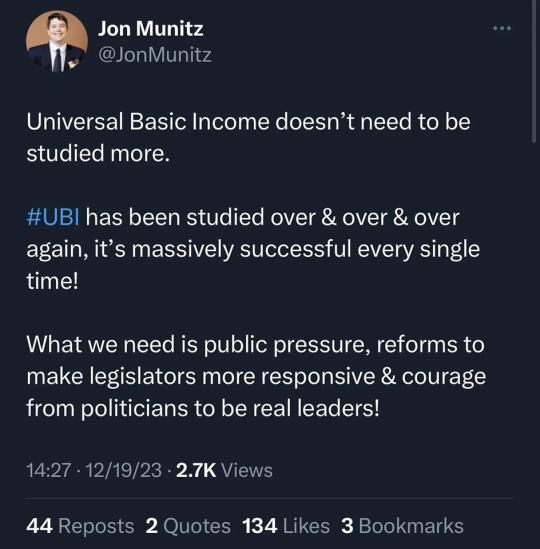
Let the choir say amend!!
#universal basic income#UBI#social welfare#unconditional income#guaranteed minimum income#poverty alleviation#basic needs#partial basic income#economic policy#wealth distribution#social security#automation#artificial intelligence#job displacement#workforce#economic equality#income inequality#financial security#economic justice#pilot projects#policy debate#political reform#COVID-19 response#economic impact#wealth gap#community economics#sustainable development#social support#economic stimulus#public policy
12K notes
·
View notes
Text

#Communism#Antisocialism#Anticommunism#Economics#Minimum Wage#Living Wage#Eat the Rich#Republican#Democrat#Libertarian#Conservative#Liberal#funny#funny meme#capitalism#socialism#dark humor#politics#anticapitalism
1K notes
·
View notes
Text
“the economist, a journal that speaks for british millionaires”-vladimir lenin
I think it’s safe to say today it’s the american billionaire.
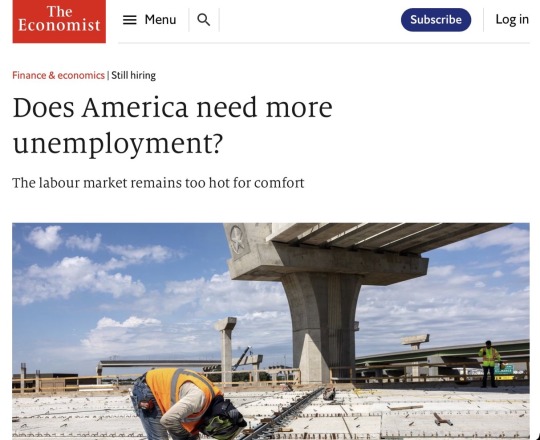
#lenin#the economist#socialist#socialism#communism#unemployment#labor#economics#labour#economy#poverty
4K notes
·
View notes
Text
Study Trick That No One Told Me.
Division of subjects:
Every subject is learnt and graded in a different way. You can't use the same study techniques for every subject you have. You have mostly 3 types of subjects:
Memorization based
Practical/Question based
Theory/Essay based
Memorization based:
Mostly Biology, Sciences, Geography etc are fully based on memorization and so you'll use memory study techniques like flash cards and active recall.
Practical/Question based:
Maths, Physics, Chemistry, Accountancy etc are practice subjects. The more you do your questions and understand how a sum is done, the better you can score.
Theory/Essay based:
English, history, business studies etc are theory based. The more you write, the way you write and the keywords you use are the only things that will get you your grades. So learn the formats and the structure on how to write your answers
Note: Some subjects are a combination of the three. Like Economics etc
The reason we divide the subjects is because you can adopt the right study methods for the right subject. Like ex: business studies is mostly based on how you write your answer and the keywords, if you're gonna spend your time memorizing in this, it's a waste of time and energy.
Hope this helps :)
#studyblr introduction#studyblr#study motivation#school#study blog#student#studyspo#studying#study aesthetic#high school#study tips#study buddy#studybrl#study break#study goals#goals#academic goals#academic girly#it girl#senior year#self improvement#student life#studyblr community#high school studyblr#high school tips#study hard#study#accounting#finances#economics
456 notes
·
View notes
Text


Why Dr. John Henrik Clarke Is Correct About Black People Having No Friends (and why We Don’t Need Any) – a Garveyite Perspective
Dr. John Henrik Clarke famously stated, “Black people have no friends.” For many, this may sound harsh, but it is a sobering truth when viewed through the lens of Pan-Africanism and Marcus Garvey’s philosophy. Garvey understood that Black liberation can not depend on external allies; it must come from within—rooted in self-reliance, unity, and a shared commitment among Black people globally.
Here’s why, Dr. Clarke’s statement rings true and why, from a Garveyite perspective, Black people don’t need friends—only each other.
1. History Proves It
From colonialism to the civil rights era, supposed "friends" of Black people have repeatedly betrayed or abandoned us. Other groups have leveraged Black struggles for their own gains, only to leave Black people behind once their goals were achieved.
Post-slavery labour movements excluded Black workers.
Civil rights coalitions saw other groups gain rights, while Black people remained trapped under systemic racism.
Garvey and Clarke both saw these betrayals as evidence that Black people must prioritize their own interests and stop relying on others.
2. Global Anti-Blackness Is Real
Anti-Blackness isn’t confined to one region—it’s a global phenomenon. Across continents, Black people face systemic oppression, discrimination, and dehumanization.
Other groups often form alliances to protect their own power while marginalizing Black voices.
Even in spaces of shared oppression, anti-Blackness often takes precedence.
Dr. Clarke’s assertion and Garvey’s vision both point to this truth: Black liberation must come from within because no one else will prioritize us.
3. Dependency Leads to Exploitation
Depending on outside "friends" or "allies" often comes with hidden costs. Foreign aid, alliances, and solidarity movements often prioritize the interests of others over Black liberation.
Aid to African nations often perpetuates dependency rather than fostering self-sufficiency.
"Allies" in social justice movements often centre their struggles, leaving Black people to fight alone.
Garvey warned that dependency breeds vulnerability. Clarke reinforces this: Black people must build their own systems to avoid exploitation.
4. We Have Everything We Need
Garvey believed that Black people possess the resources, talents, and ingenuity needed for liberation.
Africa’s wealth: With its vast natural resources, Africa can fund global Black empowerment if reclaimed from exploitative systems.
Diaspora talent: Across the globe, Black communities excel in innovation, creativity, and resilience.
Dr. Clarke’s statement echoes Garvey’s vision: We don’t need friends because we already have all the tools for success.
5. Cultural Exploitation Is Proof of No True Friendship
Black culture—music, art, fashion, and more—is celebrated globally, but Black people are rarely compensated or empowered by their own creations.
Other groups profit from Black innovation while perpetuating anti-Black systems.
Cultural exploitation demonstrates a lack of true solidarity.
Garvey’s solution: Black people must reclaim their culture and use it as a tool for empowerment, not exploitation.
6. Unity Is Our Greatest Strength (and Threat to Oppressors)
A united global Black community is the most powerful weapon against systemic oppression. Garvey emphasized unity, and Clarke’s assertion underscores why others fear it:
A unified Black world challenges global power structures that thrive on division.
By focusing on internal unity, Black people strengthen themselves and disrupt oppressive systems.
7. Allies Often Divide Us
Alliances can create divisions within Black movements, as external influences pit factions against each other or dilute the focus on Black liberation.
During the civil rights movement, alliances often marginalized more radical Black voices.
Today, funding from external groups can cause conflicts between grassroots Black organizers and larger organizations tied to outside agendas.
Garvey’s emphasis on self-reliance offers a solution: Black unity must come first, free from outside interference.
8. Other Groups Prioritize Their Own Interests
Every group prioritizes its own survival and progress—it’s not wrong, but Black people must learn from this.
White nations maintain global alliances to uphold their dominance.
Asian nations focus on economic self-sufficiency.
Jewish communities have built strong networks to protect and uplift their people.
Garvey and Clarke would agree: It’s time for Black people to do the same and put themselves first.
9. Historical Success Through Self-Reliance
History proves that Black people thrive when they rely on themselves:
The Haitian Revolution succeeded because enslaved Africans united and rejected external dependence.
Garvey’s UNIA (Universal Negro Improvement Association) built businesses, schools, and a global movement without outside help.
These examples show that self-reliance works. Black people don’t need friends—they need focus.
10. True Liberation Is Self-Determined
Liberation can not be outsourced, gifted, or borrowed—it must be self-determined. Allies may help temporarily, but no one will prioritize Black liberation over their own interests.
Garvey envisioned a world where Black people controlled their own economies, politics, and resources.
Clarke’s assertion reminds us that we can’t afford to waste time seeking validation or support from others.
11. Black Liberation Threatens Global Power Structures
Both Garvey and Clarke understood that Black liberation isn’t just a struggle for freedom—it’s a direct threat to the systems of power that dominate the world.
A free and united Africa would undermine Western economic dominance, which relies on exploiting African resources.
A globally empowered Black diaspora would disrupt industries, politics, and systems built on anti-Blackness.
This explains why no other group can truly be a friend to Black liberation. Their survival often depends on maintaining the status quo that oppresses us.
12. “Allies” Often Centre Themselves in Our Struggles
Even when other groups claim to stand in solidarity with Black movements, their involvement often centers their own experiences, narratives, and priorities.
Non-black allies frequently shift attention to their struggles, leaving Black people to carry the burden of fighting for everyone else.
Movements like Black Lives Matter have seen external groups co-opt their messages for personal or political gain.
Garvey’s philosophy reminds us to stay focused on our own goals and not allow our movements to be hijacked.
13. Romanticizing External Help Distracts from Pan-African Solutions
One of the pitfalls of seeking allies is the belief that external help is necessary or even superior. This mindset can prevent Black people from exploring Pan-African solutions.
Garvey’s vision of “Africa for Africans” called for African nations and the diaspora to work together without relying on foreign nations or systems.
Clarke’s statement reinforces this idea: the best solutions come from within. Black people don’t need external friends—they need internal unity.
14. Allies Often Maintain Anti-Black Systems
Even so-called “progressive” allies often uphold the same systems that oppress Black people.
Corporations claiming to support racial justice continue to exploit African resources and labour.
Governments speaking out against racism still engage in policies that harm Black communities worldwide.
Dr. Clarke and Garvey both understood this hypocrisy. Real liberation requires rejecting systems that perpetuate oppression, even if they claim to support us.
15. Our Focus Should Be on Building Future Generations, Not Pleasing Others
Garvey often emphasized the importance of preparing future generations to lead and succeed independently.
Clarke’s warning about having no friends reinforces this: Why waste time seeking allies when we could be building schools, economies, and systems that empower our children?
A Garveyite perspective prioritizes creating a legacy of self-reliance and leadership that ensures the survival and progress of Black people globally.
By focusing on the future, Black people can stop relying on the approval or assistance of others and instead secure their own destinies.
Final Reflection: All We Have Is Us, and That’s Enough
Dr. John Henrik Clarke’s statement and Marcus Garvey’s philosophy both lead to the same conclusion: Black people must take responsibility for their liberation. True freedom can not and will not come from allies—it must come from within. The power lies in our hands, in our unity, and in our shared commitment to self-determination.
We don’t need friends. We need ourselves.
#marcus garvey#Dr John Henrik Clarke#Garveyism#pan africanism#self reliance#No Allies#black unity#black liberation#Anti Blackness#economic independence#black people#black history#black#black tumblr#blacktumblr#black conscious#africa#black power#black empowering#black future#Global Black Community#black leadership#african diaspora#black diaspora#black culture#african culture#people of color#POC
343 notes
·
View notes
Text
Literally. Be vigilant I love you. Something beautiful is going to happen. True love is possible only in the next world—for new people. Tomorrow is just a whisper away. We refuse to accept that the world has to remain like this. It's the world and you're made of it, you can't be unmade now. This is somewhere to be, this is all you have but it's still something. Things can't go on like this forever; something will give, it always does. Comrades, the forsaken, the wretched, who tried to rise against the horrors of the world. She would die to return to it. One day I will return to your side. They're beautiful and true—and they will win. The future can be better than the past, if we're willing to work and fight and die for it. In dark times, should the stars also go out? I exist. I exist too.
#txt#literally i go and do something else for a while. for months. and then suddenly i'm like “man disco elysium was so good”#the tower stood for a moment and the insulindian phasmid exists and the future can be better than the past.#we believe it because it's impossible.#and by believing in it we make the impossible possible#this game is about HOPE it is about the FUTURE it is about COMMUNISM!!!!!!#I love you inframaterialism I love you Mazovian Socio-Economics I love you Girl Child Revolution I love you Insulindian Phasmid#disco elysium#I originally didn't out this in the tag but it's been a year & a half and it still got 1k notes so I think it's fine to put it in my DE tag#for archival purposes now
1K notes
·
View notes
Text

#us politics#world politics#economics#economy#capitalism#anti capitalism#eat the rich#colonization#genocide#slavery#war#communism#famine
184 notes
·
View notes
Text
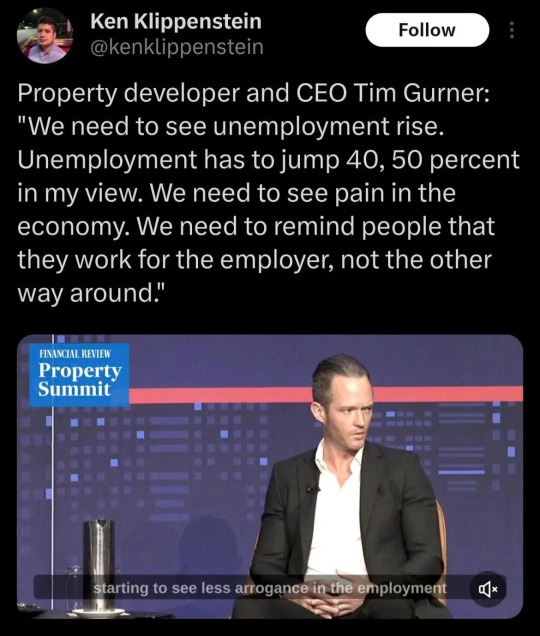
these people unironically need to have their heads paraded around the streets on pikes
#economy#economics#politics#unemployment#poverty#socialism#communism#capitalism#fuck this dude and his fucking forehead
1K notes
·
View notes
Text
One of the funniest things about communism is that it rests on a premise that's basically like, "Hey, once everybody voluntarily gives up a specific set of strategies and advantages, everything will be wonderful. So, once we figure out how to coerce everybody into voluntarily giving those up, we'll be set."
178 notes
·
View notes
Text

Hey so what better way to start up my tumblr page than to post what is esentially a communism fanart? Sort of? Communism-inspired??? But also my favourite artwork I have done to this day.
#disco elysium#disco elysium fanart#mazovianism#am i gonna tag this as#communism#yes i am#ultramaterialism#fanart#mazovian socio-economics#star-and-antlers#if you don't know also just a#deer#digital art#game fanart#videogame fanart#favourite artwork#new user#antlers#tamquirafanart
250 notes
·
View notes
Photo

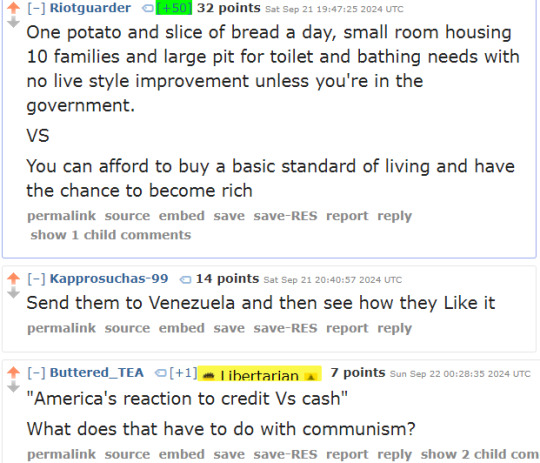
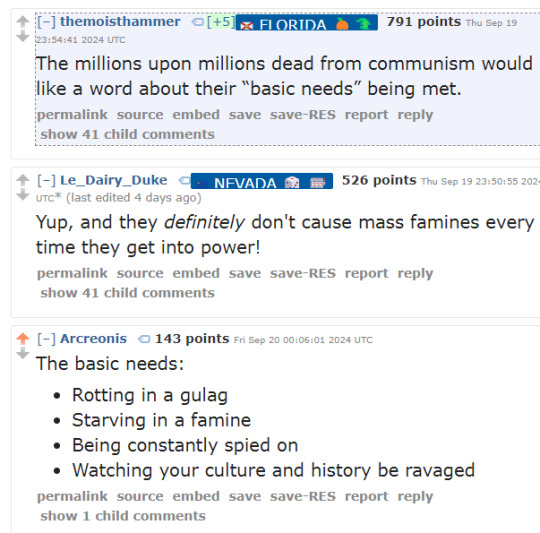
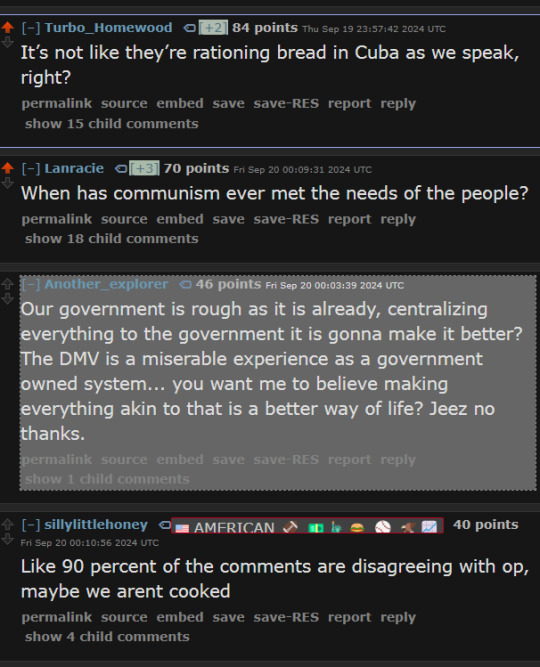

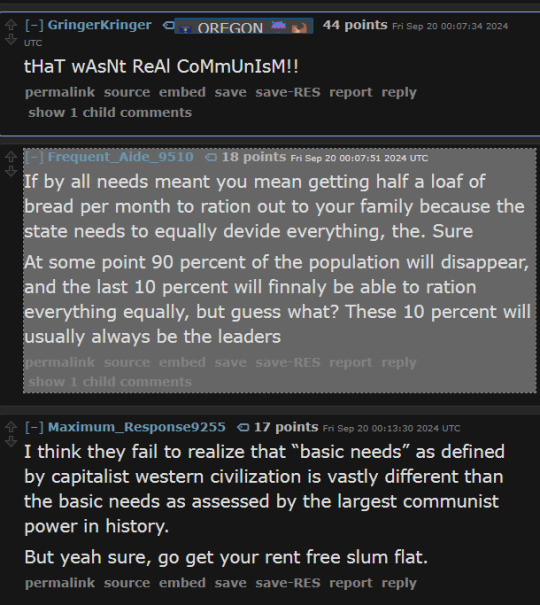

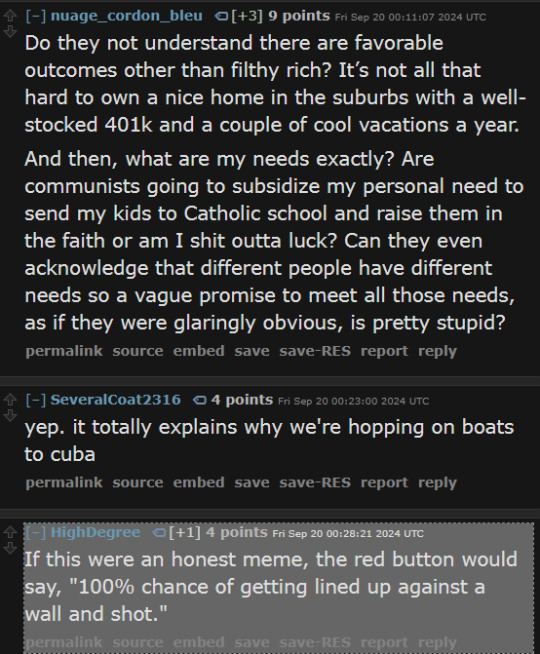
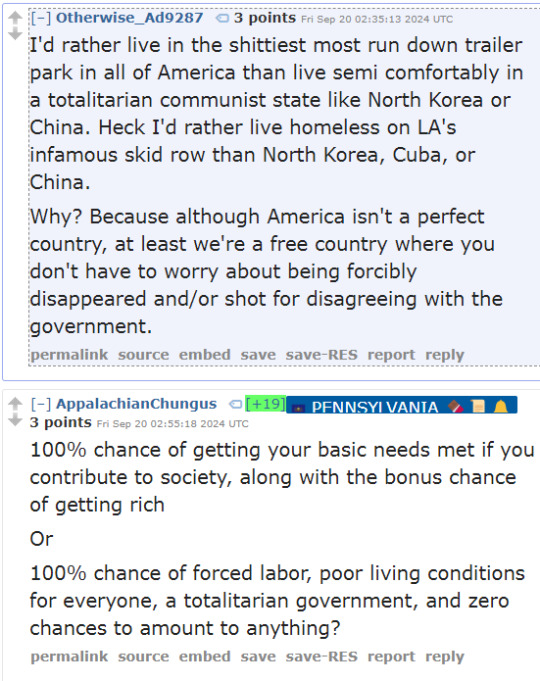
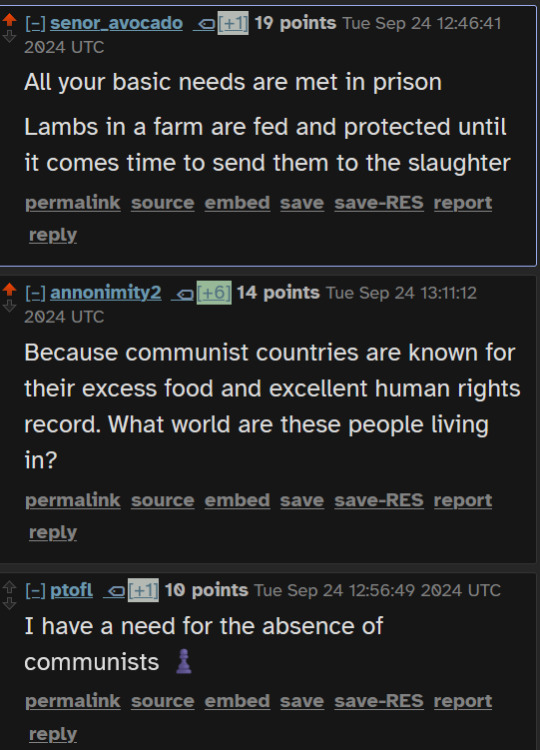
Anyone ever noticed how so many leftist memes lack...restraint?
The memer had to add the capitalist pig with a speech bubble, because apparently just mocking the "bad" decision wasn't enough.
They had to also imply that any Yank who disagrees is nothing but a brainwashed sheep.
Seems a biiit like projection.
Also, what does this have to do with credit vs. Cash?
261 notes
·
View notes
Text

#Communism#Antisocialism#Anticommunism#Economics#Minimum Wage#Living Wage#Eat the Rich#Republican#Democrat#Libertarian#Conservative#Liberal#funny#funny meme#capitalism#accounting#office humor#socialism#consulting#dark humor#politics#anticapitalism
421 notes
·
View notes
Text
activelyblack
Thank you to the Tribe in Los Angeles that came out to our @activelyblack History Month Celebration!! It was amazing to feel the love and energy from all of the people who came to just celebrate US! So many Black people just basking in your Beautiful Blackness 🖤🖤✊🏿✊🏿 With all of the anti-Black rhetoric and energy that is growing, we just wanted to create a safe space filled with Black LOVE. WE DON’T NEED THEIR PERMISSION TO CELEBRATE US! In a world and society that hates you for being who you are, Loving yourself and loving your people is revolutionary and a protest in itself. As the world doubles down on telling you that you are less than, not as smart as, not valuable, etc… We are here to remind you not to believe those lies. THERE IS GREATNESS IN OUR DNA! 🧬🧬✊🏿🖤
#black excellence#activelyblack#black people#black culture#music#black art#black community#black conscious#black couples#black economics#black entrepreneurs#black films#black history#black health#black joy#black liberation#black lives matter#black pride#black spirituality#black tumblr#black wealth#blacklivesmatter#buy black#black americans#black cinema#black feminism#africa#black is beautiful#black history month#black history 365
70 notes
·
View notes
Text

#buy black#black history#black people#blacktumblr#black#black tumblr#pan africanism#black conscious#africa#black power#black empowering#be black#black economics#african diaspora#black unity#black owned#black pride#pro black#black excellence#rbg#black wealth#buy black movement#black community
115 notes
·
View notes
Text
ARE YOU READY TO SCAN YOUR ID AND TO HAVE YOUR SOCIAL RATING CONFIRMED BEFORE YOU BUY GAS? CHINA DOES!
"👀 You can only fill up your car with petrol in China after confirming your social rating."
Or the alternative - electric vehicles? All are connected to the web and the authorities have ability to shut down your vehicles remotely if social rating is not acceptable. A digital ID and cashless society with all transactions monitored by the government is a real threat to our individual freedoms!
#socialism#the great awakening#government corruption#democrats#world economic forum#leftism#marxism#leftists#left wing#communism memes#wef#illegal immigration#bill gates#donald trump#fkh
236 notes
·
View notes